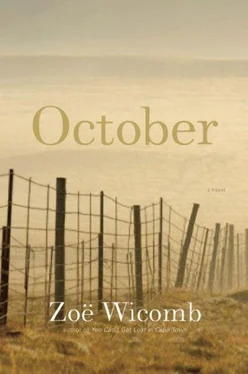If Mercia is past crying, it is also no time for irony. As for Jake, poor Jake for whom it has been so much worse, who has thus far borne it on his own, will there be a second chance? This poison is more potent than alcohol. If only she could carry some of that burden for him. She should feel rage on his behalf, but it is too late; she does not hold out much hope for his recovery.
Thank God for the ease of driving in the small hours. Mercia tells herself that she will overcome her self-pity, that the mind will strike a deal with the heart, allow it to throb to a new beat of compassion. She is on her way back to Kliprand. She does not want to see Sylvie, but she will; she must try to make amends. As for the problem of the child, who surely should be removed from the poison of the past. . well, she doesn’t know. He ought to be taken away, ought to be relieved of the burden of home and the legacy of shame. She ought to give him a new life in the gloom of Glasgow where he could warm his hands at a hearth glowing with the uniform pellets of smokeless fuel. She does not see her way clear to doing so.
When Mercia arrives in Kliprand after five a.m. she feels for the first time the exhaustion of having driven all that way and back. Even the car seems to sigh deeply when she turns off the engine. She gets out quietly, stretches, and tiptoes to the stoep. There is the same stirring sky of her childhood, with fading stars and a paper pale half moon bowing out to the faint glow of the day’s arrival — the surge of light that tugs at her heart. The view of flat-topped mountains in the distance is the same as that of the house in which she grew up. She ought to be sipping coffee, her mother’s mixture of coffee and chicory that Mercia imagines the Huguenots to have brought to the Cape centuries ago. In this house there is only cheap instant coffee, and Mercia has thought it impolite to buy her own. It would only have confirmed Sylvie’s view of her as a snob. Better to say that she does not drink coffee.
In the morning air there is a strange smell of cold ash that makes its way to her mouth, so that she imagines tasting it. It is the spent smell of cinders; it belongs to the outside grate where Sylvie does her braaivleis and baking, where yesterday’s fire for grilling roosterbrood has died down. Mercia has an inkling that she has somehow offended Sylvie, but really there is no point in pondering where and how their words clash or miss each other.
As the red deepens and the sun appears on the horizon, Mercia unlocks the front door and tiptoes in. How strange that Sylvie, an early riser, is not yet up. Mercia goes to the kitchen; she will die without a cup of coffee. Or so it comes to her, the fear of facing Sylvie, so that she puts on the kettle, searches for the jar of instant coffee. The sound of the lavatory flushing through the house makes her brace herself for what lies ahead.
It seems like an age before Sylvie comes in. She sits herself down at the table in silence, as if for an interview. Mercia has her back to her, holding an empty coffee mug. Thank God for Nicky, who stumbles into the kitchen in his pajamas.
You’re back from Cape Town? he asks, evidently pleased.
I’m back, she says, and turning round, smiling at the boy, says that she’ll make coffee for them, that she needs another mug. For an instant her eye catches Sylvie’s.
So Sylvie knows. Knows that she knows. Mercia fears that Sylvie will speak, offer explanations or details, but of course the child is there. The girl bows her head while Mercia chats with Nicky, but then she rises, supported by her left hand placed flat on the table. She looks up, willing Mercia to look at her.
How will all this be paid for, this treatment of Jake’s? she asks.
Mercia assures her that she will deal with it. In fact, she says under the girl’s frank gaze, what they should do today is open an account in Sylvie’s name so that she could handle the expenses herself. Mercia will make monthly payments into the account. There will be enough for Sylvie to see to the mortgage, to ensure that they do not get evicted.
Sylvie sits down once more, stretches her legs, leans with her elbow on the corner of the table. She stares listlessly ahead at the shafts of sunlight slanting above the lower door. She lifts her arm, then lets it fall, a guillotine through the swirling, dazzled motes of dust. Mercia waits until, eventually, Sylvie speaks. The girl is strangely composed, her face youthful, luminous, as she looks up unflinchingly, into the sunlight.
She would rather not have anything to do with money, Sylvie says with quiet dignity. If Mercia could arrange to settle Jake’s bills herself, she would be grateful. It is best not to rely on her to make payments. So there is no need for an account in her name. She would rather not have that responsibility. For herself and Nicky there is no problem. She’ll manage. As for the house, she knows that Jake will not come back, either to her or to that house, so there is no need to secure the house on her account. She and Nicky will manage all right.
Mercia cringes at the thought that it is Sylvie who so definitively has washed her hands of them, the Murrays, that she does not expect compassion, that she won’t be bought off. Indeed, Sylvie rises swiftly, light-footed, as if divested of her burden, rolls up her sleeves, and says that Jake’s room has not been cleaned for the entire two weeks that he took to his bed.
Mercia would like to show that she understands. A better person would put her arms around the girl, but that she cannot do, that is not possible. She turns to the child, pulls him onto her knee and with her arms around him says that she understands. That she will stop off in town to arrange the payments for Jake’s care. Sylvie says that not once has that window been opened, that Jake’s room is disgusting. With a broom and mop, she sets about it, whilst a chastened Mercia sets about packing her bag. There is nothing else to do. She wants to support them, not only out of guilt, she realizes; rather, because they belong to her, because this girl who has risen above abuse and misery without any help demands her respect. Sylvie is her inheritance, but she cannot insult Sylvie with further offers.
Nicky, who has wriggled off Mercia’s lap, helps her pack. He searches his pockets frantically, then rushes off to consult his mother, who arrives with his good trousers. From their pockets he extracts a piece of string, a glass marble and a pigeon’s tail feather, whilst his mother looks on smilingly. Here, he says, he has found these presents for Mercia, but if he had known she was going so soon, he’d have got her something special like the porcupine quills he left at his ouma’s house.
Mercia says that these are the best presents she has ever had. She swallows back the unexpected tears as she kisses him goodbye. It won’t be long, she promises, before she’ll be back for those porcupine quills. Then she remembers the camera. Here, she says to Sylvie, this is to make sure that you send me photographs of the two of you. She shakes Sylvie’s hand, slides into her seat and is about to drive off when the woman puts a restraining hand on her arm.
You will, she asks in a strangled voice, take care of Nicky?
Yes, of course, Mercia finds herself saying, bewildered, not knowing what it means, what she means. Look, I’ll be in Cape Town for a few days. We could talk on the phone, later. Then she amends it. Listen, I have to be back in two months to see to Jake. That gives us all time to think things over. I’ll keep in touch. I’ll let you know.
How bloody awful. How the woman must wish she were a fucking tortoise. Summoning from God knows where the courage, the dignity, to free herself from them, the poisonous Murrays, only to be thrown back once more into their clutches — for the sake of her child. Is that what mothers have to do? Eat humble pie? Prostrate themselves for the sake of their children? Sell themselves? How wretched, how absolutely wretched for Sylvie.
Читать дальше












